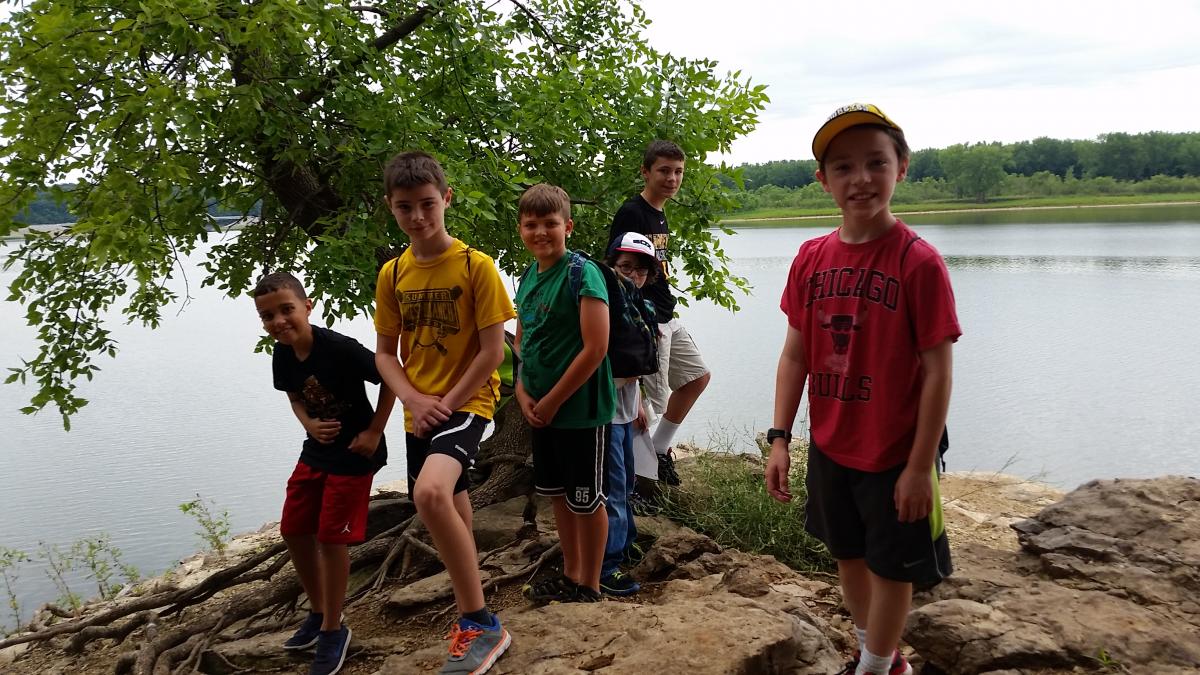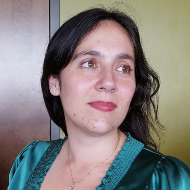In my previous installment I discussed our first day at camp, how we talked with kids about evolution and DNA, then took them to tour the facilities and extract DNA at Integrated DNA Technologies. This was a great approach to dealing with creationist students, since it avoided many of the anti-evolution arguments they’ve often heard. This prevented kids from potentially hijacking the conversation with a prepared script, rather than engaging in learning. It was also a fun beginning to the camp for any kid who likes science and technology, as it provided not only educational but also career modeling opportunities.
For our second day at camp, we wanted to spend more time on evolution in organisms. Our theme for the day was adaptations. We had the kids look for adaptations in extant and extinct organisms. In the morning we took them to visit the Iowa Raptor Project, a facility that rehabilitates injured predatory birds. Most kids know the word “raptor” in a Jurassic Park context. While some were initially disappointed we weren’t going to see that kind of raptor, I reminded them that the movie ended pretty poorly for most of the humans. (We also talked about how words can mean more than one thing.) We talked about how birds and dinosaurs are related, and how the modern animals we call raptors have some adaptations that are like the raptors from Jurassic Park.
The kids were divided into small groups and set out to explore the facility. They saw many types of live predatory birds—animals that can’t survive in the wild, and who now have permanent homes at the center. Kids noticed how different groups of birds had different sizes and shapes of eyes, feathers, and claws. They talked about how these adaptations were related to the types of animals and fish they hunted, where they made their homes, and their hunting strategies.

After lunch, we applied these conversations to extinct organisms by taking the students to the Coralville Devonian Fossil Gorge. This site has an incredible number and quality of exposed Devonian fossils. Our friendly local paleontologist, Tiffany Adrain, volunteered to give the kids a guided tour of the gorge. The plan was that she would show them different fossils and have the kids talk about what sort of adaptations they might display. As luck would have it, the weather did not cooperate. It started to rain, and suddenly we were dealing with dozens of ten-year-old maniacs running around on wet razor-sharp rocks. Dreading the prospect of explaining so many potential injuries to so many potentially angry parents, we pulled the kids into the visitor center and ran a modified indoor activity.
Again, we had creationist students object to the discussion, specifically to the age of the fossils and the Earth. This time, other students responded and said that they wanted to hear from the expert.
We didn’t discourage the creationist campers from speaking up, and we answered their questions appropriately and respectfully. In other words, we encouraged everybody to have good manners and we discouraged anyone from disrupting or shouting down anybody else. But the kids’ appeal to authority did have an effect on all of the students. In Iowa City we are particularly fortunate to have a very warm, friendly fossil expert who has a child of her own and is very comfortable working with children. The kids in the camp responded to her not only as a scientist, but also as a mom. Two powerful sources of authority!
Seeing the children interact with each other on the topic of evolution vs creationism was very interesting. Having adults model positive behavior was clearly important to them. The kids knew it wasn’t acceptable for the situation to devolve into a shouting match, and that we wouldn’t tolerate anyone being put down. The message was clear: we there to learn. All of the adult volunteers acknowledged the paleontologist’s authority on this topic. When the kids asked us questions about the fossils that we couldn't answer, we also asked the expert.
Demonstrating a respect for expert knowledge is an important part of evolution education, as well as admitting when one is not an expert. Some of the creationist students had genuine questions for our expert once they realized this wasn’t going to be a debate about the age of the Earth. These students wanted to know how scientists knew how old the fossils really were. The students were genuinely curious, and they received clear and detailed answers from an expert. Their questions were respectful. The kids seemed thoughtful.
Some of my volunteers were disheartened that we were still hearing creationist objections on the second day of camp. I thought it was a good sign that people were still talking. Many educators have had students sit silently through a lesson on evolution, then write very negative evaluations about the class. If people are communicating and asking questions, we have done something right in structuring a learning experience. Besides, we had three more days to go. How would the kids respond to another dose of evolution? Check out our next installment.

